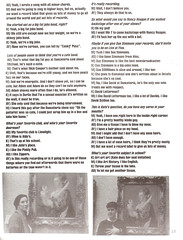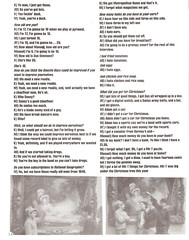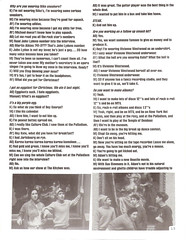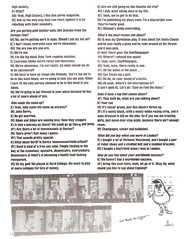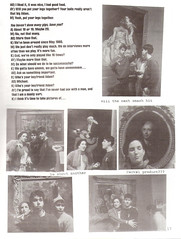Sunday, May 31, 2009
0
Follow the keyboardist
We told you months ago that Money Mark has a Twitter account. Are you following him? You should be, because the keyboardist knows secrets.
Labels:
Money Mark
Thursday, May 28, 2009
4
The Young and Skinny Joke Band
Beastie Boys at the Metropolitan Museum of Art in New York, 1984
You started out as a big fat joke band, right?
Kate Schellenbach: Yeah, a big fat joke band.
Michael Diamond: We still are except now we lost weight, so we're a skinny joke band.
9th Beastie, my Beastiemania.com colleague and pal, recently acquired a 1984 punk fanzine with an interview with the Beastie Boys. The band — then comprised of Adam Yauch, Michael Diamond, Kate Schellenbach, and a young man calling himself Adam O'Keefe — share what they had for breakfast that day, their plans for the future, the names of their favorite clubs, what they got for Christmas (Mike: I got a lot of Mr. T things for Christmas. Mr. T was big under the Christmas tree this year.), and other very important things. This material is what we refer to as "classic Beastie Boys."
Click to read. Use the "All Sizes" link above the images at Flickr to see larger images.
Labels:
press
Tuesday, May 26, 2009
11
Beastie Boys perform "So What'cha Want" on Late Night with Jimmy Fallon
The full episode of "Late Night with Jimmy Fallon" with the Beastie Boys interview and performance is available to watch.
Labels:
video
Monday, May 25, 2009
Beastie Boys on "Late Night with Jimmy Fallon" spoiler
So yeah. Beastie Boys are on "Late Night with Jimmy Fallon" tonight. Crazy me, I decided to try for a standby ticket for the show, which is not something I would recommend any sane person do because it requires enduring a lot of BS. I am happy to report that the "Luck o' the Beastie" was with me. After grueling hours of lines and check-ins at 30 Rockefeller Center, I made it into Studio 6B.
Here's a run-down of the pertinent parts of the show:
Maybe I forgot a thing or two, but I got up dang early for that standby ticket. Watch the show. It's on at 12:30 or some other time, depending upon where you live.
P.S. David Cook reminds me of that guy from Creed.
P.S.S. Fallon posted a pic of the Beastie Boys rehearsing with The Roots:

Here's a run-down of the pertinent parts of the show:
- After his monologue, Fallon tells a story about his first Beastie Boys concert and meeting Yauch. It's actually a good story. I won't tell the story. You'll have to listen to Fallon tell it. From his story, Fallon shows that he is as much as a Beastie Boys geek as I am or anyone who reads this site. He later tells the Beastie Boys that they are his favorite band ever.
- Beastie Boys enter the studio and mess with the seat cushions. Mike the Communicator, of course, takes the seat closest to Fallon. The Adams are relegated together on a sofa. Horovitz comments on Fallon's nice water cups. Horovitz hassles Fallon about having a laptop on his desk.
- Fallon asks them about their new album. Mike responds by telling an elaborate (and false) story about recording multiple new albums on Paul Allen's yacht, as well as a submarine. Heard that one before? Yauch and Horovitz play along with the yacht gag by adding their two bits.
- Fallon asks them to reveal the new album's title. Beastie Boys confirm that the album is, as they announced in their fan newsletter sent out earlier today, Hot Sauce Committee. Ta-da! Unfortunately, Fallon loses his concentration and forgets to ask anything more about the new album, except when it will be released. They reply, "In September" with some shtick.
- Fallon pulls out the Check Your Head vinyl collector's set and asks about the bonus single. Horovitz points out that he included a special bonus single in Fallon's gift set -- an autographed one of a disco single. They explain that the non-"Lee Majors Come Again/B Boys in the Cut" singles that have been found in some of the CYH collector's set came from their personal collection.
- Fallon asks them if they would be willing to perform a song from Check Your Head. The audience screams, and the Beastie Boys oblige with a performance of "So What'cha Want," backed by The Roots.
- Beastie Boys exit the stage to The Roots playing "Paul Revere."
Maybe I forgot a thing or two, but I got up dang early for that standby ticket. Watch the show. It's on at 12:30 or some other time, depending upon where you live.
P.S. David Cook reminds me of that guy from Creed.
P.S.S. Fallon posted a pic of the Beastie Boys rehearsing with The Roots:

Labels:
news
Sunday, May 24, 2009
11
Take a look around you, and a look at these lyrics
Yauch said what?
We listened, we discussed, we disagreed, we agreed, we guessed. Transcribing the lyrics for "Lee Majors Come Again" has been a challenge for the Beastiemania.com team. Take a look at what we came up with HERE at Beastiemania.com. If you have any corrections or suggested changes to the lyrics, email them to staff @ beastiemania.com or post them in the comments.
We listened, we discussed, we disagreed, we agreed, we guessed. Transcribing the lyrics for "Lee Majors Come Again" has been a challenge for the Beastiemania.com team. Take a look at what we came up with HERE at Beastiemania.com. If you have any corrections or suggested changes to the lyrics, email them to staff @ beastiemania.com or post them in the comments.
Labels:
lyrics
Friday, May 22, 2009
10
Expect new Beastie Boys album and tour this fall
From Copelandentertainment.com
Mix Master Mike's tour schedule is evidence that Beastie Boys will not be releasing their new album and touring until this fall. August [Update: now confirmed to be September] seems the likely month that fans can expect some new music and tour action. In the meantime, fans will have to be happy with the two new tracks and the announced festival performances, which are sure to be "greatest hits" sets. Beastie Boys have stated in the past that they don't like to play new songs for festival audiences because they're generally not accepted well.
From all accounts we've heard, the new Beastie Boys album is completed and has been completed for some time. A listening session with some label reps happened at the end of January. The report we heard was that "All three sound great—especially Adrock." Another source who has heard some of the album told us that it sounds very Check Your Headish. Chomp on that.
Mix Master Mike's tour schedule is evidence that Beastie Boys will not be releasing their new album and touring until this fall. August [Update: now confirmed to be September] seems the likely month that fans can expect some new music and tour action. In the meantime, fans will have to be happy with the two new tracks and the announced festival performances, which are sure to be "greatest hits" sets. Beastie Boys have stated in the past that they don't like to play new songs for festival audiences because they're generally not accepted well.
From all accounts we've heard, the new Beastie Boys album is completed and has been completed for some time. A listening session with some label reps happened at the end of January. The report we heard was that "All three sound great—especially Adrock." Another source who has heard some of the album told us that it sounds very Check Your Headish. Chomp on that.
Labels:
Mix Master Mike,
news
Thursday, May 21, 2009
7
Adam Horovitz on Soft Focus
Watch a four-part interview with Adam Horovitz (part 1 above) on Soft Focus at VBS.tv.
Video transcription (part 1)
Adam Horovitz: Oh, wow. Hi!
Ian Svenonius: So, now I have this whole theory, and I’m really glad to talk to you because I’ve never told you this theory. But this is the real theory, and I’ve been working on it for a long time: I’ve always seen this eerie parallel between the Beastie Boys—your group—and The Beatles, who are the alpha group. Wait! It’s not so crazy. What do you think about that?
Adam: I was waiting for the, you know, uh—
Ian: Well, number one: Your origins, well, a hardcore band, the start of [unintelligible]. Then Licensed to Ill, kind of a “I Want to Hold your Hand” Beatlemania. You guys were a sensation. A massive sensation.
Adam: Huge.
Ian: Huge. And in England, there was this kind of like sense of like they’re destroying culture. Unlike the way The Beatles were viewed with contempt in America. Or people were scared of them a little bit—the establishment. Then Paul’s Boutique. It’s like a kind of psychedelic excursion. That’s when you became critical darlings. And after that, your records sort of guided more, you know, the intelligentsia. What do you think?
Adam: I think that’s great. [audience laughs] Yeah, I’ll be that. I think that’s great.
Ian: Well, I was wondering if that was a conscientious—like if you conscientiously looked at the trajectory of The Beatles and then—
Adam: Or The Troggs—you know, one of those groups, yeah. Uh, no, we didn’t. We weren’t really looking at anybody. But I like that.
Ian: I mean, it’s weird, I think. I’ve told a lot of people this theory but—
Adam: And what do they say about that?
Ian: Well, I just told these people. [addressing audience] What do you guys think?
[Audience laughs]
Ian: I think it’s pretty good.
Adam: I mean, you could fit a lot of things into a lot of, you know, things—
Ian: You can fit a lot of things into a lot of things, but you can’t say The Troggs are The Beatles, for example.
Adam: No. They got—
Ian: You can’t say, like, I don’t know...
Adam: Shit. I know where you are going though.
Ian: Now, I was wondering about these stylistic changes that have marked your career. And, uh, you begin as a hardcore band.
Adam: Yeah, we started as a hardcore band right in this neighborhood. I guess it started while we were all friends in high school. We all used to go to a record store called the Rat Cage, which was right down the street from here. Kids in the city—that’s what we did. We didn’t go to school, but, you know, so you started a band. Or you know, that’s what everybody was doing. So that’s what we did. I don’t know. We were into punk rock records and hip hop records. And, you know, new wave. And all of that stuff. And I guess the hardcore was what was, you know, the easiest to play. Playing in a hardcore band is like playing like, you know, basketball or something. You’re always moving, and you’re kind of in sync with the other people. And you’re kind of doing this thing. And it’s really fun to play. And it was kind of like the punk rock records that we, you know, listened to. But it was easier in, like, that we would never sound like Blondie. You know what I mean? Or something like that. But luckily for us, I guess, growing up in New York City at that time we were exposed to a lot of creative things happening. And so I guess that sort of led us to go in different directions—musically, I guess.
Ian: Yeah, well, that’s what I was going to ask you. How did you make that transition into hip hop? And sort of, like, how did you even figure out how to make beats, for example?
Adam: Well, the thing about rap music is, you know, rap had already started in New York. So this is the early 80s. And so, rap started coming Downtown. And, you know, you’d hear it from radios and car radios and stuff like that. You know, we were drawn to it. As, you know, I guess most people in the world are drawn to rap music. And, so, we were really into it. It wasn’t a thing of where it was like that was the popular thing so we’re like we should do that because that’s going to sell records.
Ian: Yeah. It was underground music.
Adam: So, I got my first money, and I was going to go to this place called Rogue Music. This was my thing. This is real history. I’m gonna keep it real. And I had 250 bucks, and I was going to buy the black and white Paul Weller Rickenbacker guitar. Right. But I had heard about this drum machine called an 808. Right. I had heard about it. I heard it on a record before. I went to Rogue to buy this thing, but they also had a used 808 drum machine. And so instead of buying a guitar because I already had a guitar, I bought the drum machine.
Ian: Wow.
Adam: So that’s how it started for me.
Ian: So, you brought that element into your group.
Adam: Well, I had the drum machine.
Ian: Yep. Yeah.
Labels:
video
Tuesday, May 12, 2009
3
Found in Spike's shoebox
Photo by Spike Jonze
Spike Jonze and some of his filmmaking pals have created a collaborative blog titled We Love You So. In an entry posted this week, Jonze shares some out-take photos from video shoots of "Ricky's Theme" and "Sabotage," as well as some candid photos of the Beastie Boys. See the photos HERE [DEAD LINK].
Labels:
photo
Saturday, May 09, 2009
4
Complete control: Beastie Boys influence Spike Jonze

Beastie Boys on the "Ricky's Theme" video shoot. Photo by Spike Jonze.
In the special 100th issue of Juxtapoz magazine, filmmaker and Beastie Boys friend Spike Jonze is interviewed about the people who have influenced and shaped his aesthetic. Speaking of the Beastie Boys, Jonze credits them for influencing how he operates Girl, his skateboard company:
When Girl started I was doing a lot of stuff with the Beastie Boys. We'd begun to make videos and we started Grand Royal magazine, and Mike Diamond was definitely an influence. His whole thing is to do it yourself, own it yourself, control it, don't listen to anybody from anywhere else other than what you want to do. After their first record, they never let anybody get involved in anything they did. No one from outside the three of them had any control whatsoever on the music, art, video, or tour, and when the records came out, they did it all themselves. They bought their own studio and took as long as it would take to make the records and put them out when they were ready. I think that was a big influence for Girl.Also in the special issue are interviews with photographer Glen E. Friedman and artist Raymond Pettibon (interviewed by Mike Watt), whom Money Mark is currently working with on a musical project.
Labels:
news
Thursday, May 07, 2009
17
Just imagine the 42nd Street C train bathroom: Lyrics to "B Boys in the Cut"
Figuring out a Beastie Boys lyric requires knowing a thing or two about the band. There are rules. The first rule is they never rap outside their field of knowledge or area of interest (e.g., arcade and video games, television shows, movies, animals, food). The second rule is they follow the traditional rules of hip-hop music-making (e.g., acknowledge the old school, boast about themselves, voice their beefs). The third rule is no rhyme is too ridiculous or stupid for them to use.
So, with those rules in mind, the Beastiemania.com team have been deciphering the lyrics to the two new songs, "B Boys in the Cut" and "Lee Majors Come Around."
We're still debating "Lee Majors Come Around" (in particular, Yauch's first verse and Mike's third verse), but we feel fairly confident about our transcription of "B Boys in the Cut." View the lyrics HERE. If you have any corrections or suggested changes to the lyrics, email them to staff @ beastiemania.com or post them in the comments.
Labels:
lyrics
Sunday, May 03, 2009
24
Two unreleased Beastie Boys tracks in collector vinyl set
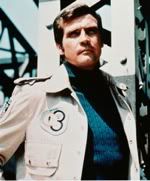 A number of fans who ordered the Check Your Head collector's vinyl set have discovered a surprise bonus 7-inch record containing two NEW, unreleased songs in the set. The bonus album has not been found in every copy of the collector's set.
A number of fans who ordered the Check Your Head collector's vinyl set have discovered a surprise bonus 7-inch record containing two NEW, unreleased songs in the set. The bonus album has not been found in every copy of the collector's set. The first track, titled "Lee Majors Come Again," is rap over hardcore instrumentation. Listen HERE.
The second track, titled "B Boys in the Cut," is an a cappella. Beastie heads will recognize the end of the track as the "My New Name Is Larry" routine that the Beastie Boys have been throwing into their live show for the last few years. Listen HERE.
Labels:
audio




